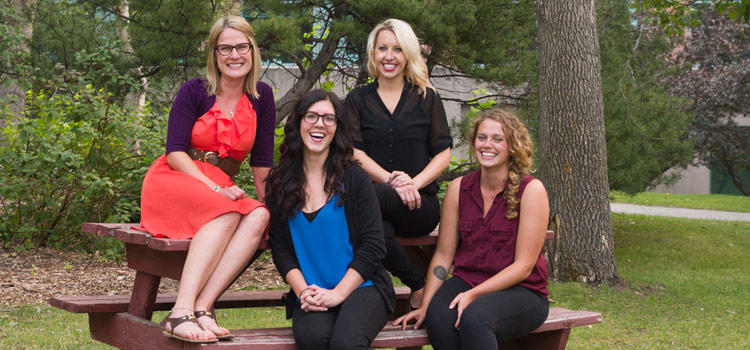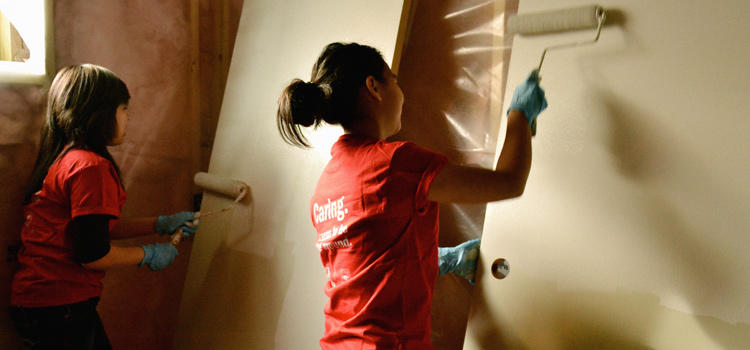
.
May 10, 2016
Education is all about preparing students to become valuable contributors to society and communities. At the University of Calgary, this preparation starts long before students graduate. Our students help fellow students and staff manage stress. They provide legal assistance to low-income Calgarians. They tutor special-needs children. They provide veterinary care for pets of low-income Calgarians. Every day, they’re making a difference in their communities.
For many low-income Calgarians and their families, their most important companion may be their cat or dog. And yet they struggle to access the routine veterinary care required to support the health of their pets and protect their own health. Seeing a need and an opportunity, in 2015, the University of Calgary’s Faculty of Veterinary Medicine (UCVM) partnered with the Calgary Urban Project Society (CUPS) to host six pet health clinics for 32 clients of the non-profit organization, which seeks to help low-income Calgarians. And the only charge to the clients was their commitment of extra time to help the students learn.
“It’s an opportunity for students to integrate all aspects of clinical practice: communication, physical examination, diagnostic, planning and treatment skills.”
“It’s an opportunity for students to integrate all aspects of clinical practice: communication, physical examination, diagnostic, planning and treatment skills,” says Jack Wilson, part of the UCVM faculty and a former veterinary practitioner. “It’s a good opportunity for students to put into practice what they’ve been learning and to help somebody at the same time.”
Supervised by their professors and local veterinarians, a group of third-year students set up temporary clinics in a CUPS apartment block. They provided health check-ups, nutrition and pet care advice, vaccines, de-worming, and care for minor ailments for the much-loved cats and dogs. Animals requiring spays or neuters were referred to another UCVM program for supporting the community – the Community-University Spay/Neuter Program – where the important procedures were again performed by third-year students as part of their on-campus program.
The 2015 pilot program was so successful that it's been integrated long-term into the third-year veterinary medicine curriculum and has been expanded to include other Calgarians in need. The program not only helps the animal companions, but draws out those in need and engages them in conversations about health in a safe environment.
Says UCVM’s Serge Chalhoub, who started the program with Wilson. “It was a heartwarming experience for everyone.”
A group of UCalgary law students hopes to make the world a better place. And they’re starting with Alberta’s landlord-tenant laws.
The students – all second- and third-year – are taking a new course offered through the university’s Public Interest Law Clinic. Supervised by UCalgary professors and local lawyers, the students tackle public interest banner cases as part of the course.
“We’ve chosen to represent the interests of vulnerable tenants of low- or no-income housing because our province’s tenancy laws are convoluted, favour landlords and are in need of reform,” says Molly Naber-Sykes, a Calgary-based lawyer and the clinic’s executive director. “Our mandate isn’t to represent individuals. Rather, we are trying to identify systemic issues with the law and to represent groups of people who are disadvantaged by those issues.”
Until now, the city has not had a public interest clinic that focuses on precedent-setting advocacy serving groups of people with a common interest, notes Naber-Sykes. While the course is currently focused on landlord-tenant issues, that may change down the road. Naber-Sykes and her team may focus on health and environmental issues, in addition to housing.
Being a student can be stressful: exams, tight budgets, living away from home. But a group of UCalgary classmates has found a fresh way to boost the mental health of their fellow students.
The Mobile Self-Care Team was created by five graduate students – Sarah Tkaczuk, Olivia Cullen, Yolanda Weltzin, Sandi Huynh and Emily Gunn – within UCalgary’s social work faculty. Once a month, they host mobile stress-release events for students and staff across all faculties on campus. Each event is casual, fast and free, and is funded by a Students’ Union grant and donations from the public.

.
One day, the team set up a temporary painting station; people were encouraged to relax and paint, and then take their art or leave it for others. Another time, they encouraged passersby to create self-care kits filled with worry stones, playdough and candy. “They’re filled with different items that reach all five senses,” says Cullen. “They’re simple toys and activities you can use to relieve stress.” Simple, perhaps. But effective. The bags were so popular, the group hosted a similar event this spring.
“We know students experience burnout,” says Gunn. “We think it’s important to find ways to help.”
To contact the Mobile Self-Care team, email mobileselfcareteam@gmail.com.
When Emily Catsirelis graduates this year from the University of Calgary, she’ll be ready to teach every type of student who may be in her classes. She’s done her best to prepare, thanks to an innovative, optional service-learning program with the class, Diversity in Education, that’s part of the Werklund School of Education’s required curriculum.
Founded and taught by Darren Lund, professor at the Werklund School of Education, it's a new way of preparing future educators for the classroom. “Classrooms are more diverse, society is more diverse, and you have to address that diversity as a teacher,” Lund says. “This course, with its community engagement option, gives practical face-to-face opportunities to build relationships with these kids and become the best educators they can be.”

.
“Our goal is not cultural competency. It’s more about cultural humility: what can our students learn from these amazing kids?”
Students work with groups across Calgary, including Calgary Bridge Foundation for Youth, Between Friends, Boys & Girls Clubs of Calgary, Calgary Sexual Health Centre, Renfrew Educational Services and more. Each student who takes the course then volunteers with one of these agencies – perhaps playing sports with kids or leading a study group.
In Catsirelis’ case, she helps a girl she met through the course, while volunteering at Between Friends. “We do literacy games. We work on chapter books and other fun activities,” says Catsirelis. “I learn so much about teaching and about special needs, and I really look forward to being with her.”
The diversity of students in today's classroom is huge: immigrant, refugee, First Nations, Metis, Inuit, LGBTQ kids as well as youth with disabilities. “Our goal is not cultural competency,” Lund says. “It’s more about cultural humility: what can our students learn from these amazing kids?”
You’re in trouble, but you can’t afford a lawyer? Maybe the team at Student Legal Assistance (SLA) can help.
“We provide free legal assistance and representation for people who can’t afford lawyers in criminal, civil and family law matters,” says Michelle Christopher, SLA’s executive director.
“Plus Student Legal Assistance provides hands-on training for law students on how to handle files and provide legal services.”
For the past 37 years, the registered charity has offered direct, one-on-one legal representation for UCalgary students and low-income members of the public. More than 120 law students and 140 local lawyers are volunteering this year with the on-campus law clinic, which operates full-time and year-round with help from three full-time administrative staff. Funding comes from the Alberta Law Foundation, the UCalgary Students’ Union and others.
“We provide free legal assistance and representation for people who can’t afford lawyers in criminal, civil and family law matters."
Located in UCalgary's Murray Fraser Hall, Student Legal Assistance handles roughly 600 cases each year. While individual cases vary, case workers may help with impaired driving, domestic assault, mischief charges, even some drug offense charges, “criminal matters where the Crown is not seeking jail,” says Christopher, who is also an instructor for the clinical programs in the university’s Faculty of Law.
Students may also assist with cases involving animal rights, human rights and contract disputes. “And on the family law side of things, they work on everything from child support to custody, that kind of thing,” Christopher adds. “Some students really love doing criminal work. Some are really stoked to work on family files,” she says. “But they all gain valuable court experience and client management skills while working to help someone who needs it.”
A cup of tea and conversation can be enough to change someone’s world. Just ask Judith Hanson, a nursing instructor at the University of Calgary. Every week, from September to April, for the past six years, Hanson has taken a group of eight nursing students to the Confederation Park 55+ Activity Centre. There, they meet with about 150 senior citizens for a fun, yet life-enhancing program called “T and C.”
“It’s literally tea and cookies or cake and coffee,” says Hanson. And there’s plenty of conversation and dancing, too. “The students dance with the clients and just generally learn how to communicate with the seniors,” says Hanson. “It’s a very welcoming environment.”
“The students dance with the clients and just generally learn how to communicate with the seniors. It’s a very welcoming environment.”
The program is part of integrated Nursing Roles and Practices, a nursing course that aims to involve students in the community, and to give students – more than 90 since the partnership began – opportunities to build skills they’ll need when they’re working as nurses. And for the seniors, it’s a chance to interact with a younger generation that they may know little about.
“For some of these clients, this may be their only outing all week, because they’re living alone at home and they don’t have transportation,” says Hanson. “They look forward to coming all week.” The students also identify various needs at the centre – and then help to solve those needs. One year, they created a grief brochure, listing helpful services around the city. Another year, they applied for funding for a defibrillator.
And sometimes they simply provide an attentive ear and a cup of tea. “One student commented to me that there are smiles on the clients’ faces every week when we walk in,” Hanson says.
“Sometimes all we have to do is just listen.”
To start a conversation on how our students can help with community initiatives, please contact the Centre for Community-Engaged Learning.